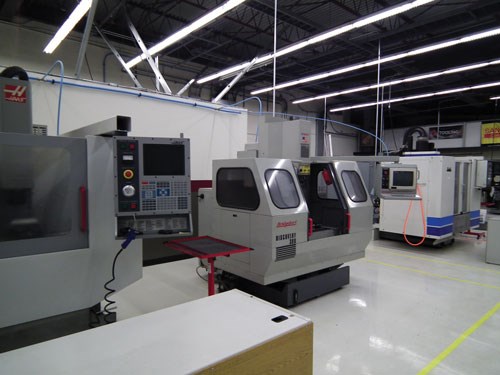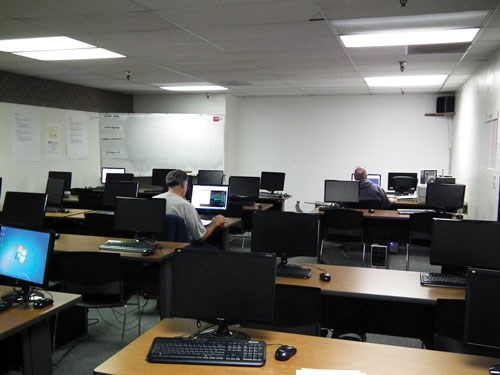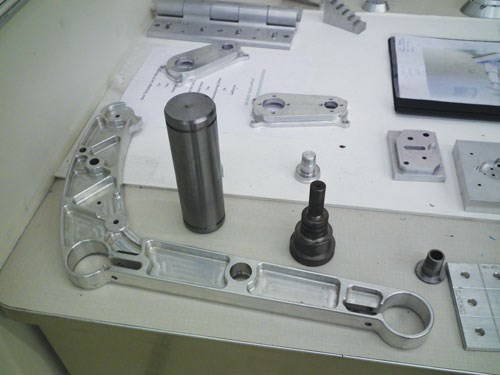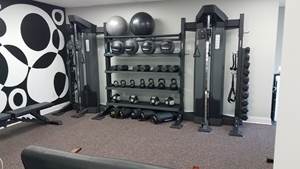Training for the 'Real World' Provides Unique Opportunities
When students register for continuing education, they don’t typically expect to be signing up with an institution that also offers an in-house staffing service, a NIMS credential program and real world, hands-on training every step of the way to the perfect job.
When students register for continuing education, they don’t typically expect to be signing up with an institution that also offers an in-house staffing service, a NIMS credential program and real world, hands-on training every step of the way to the perfect job.
Technical Employment Training Inc. (TET), San Bernardino, Calif., understands there is more than just the conventional way of teaching a student in the classroom: Real machine shop experience is necessary to train students for a successful future and that includes having credentials before becoming employed at a machine shop. Mike Gallo, CEO, and President Dr. Bill Clarke’s vision has always been to provide a comprehensive curriculum, direct business and industry linkage, national conferred credentials, and in-house placement services. TET’s goal is to “make America great in manufacturing.”
“We are an operational shop with a training overlay,” says Virginia Martinez, operations manager. “Our 630-hour course takes students from no skill sets to entry-level skill sets by using on the job training with real life projects. Each of our students goes through training with NIMS, and credentials are proctored by a third party, so TET is taken out of the picture.”
TET is a non-profit business and education cooperative and was formed in partnership with the San Bernardino County Superintendent of Schools Regional Occupational Program to provide manufacturing trades education and hands-on machinist skills training to prepare students for NIMS credentials. The facility, which emulates a job shop, has been in operation since July 2010, and since then it has placed 83 percent of its graduates in a job position. Since July 2011, there have been 120 students who have gone through the program. About 40 students are currently enrolled.
The curriculum introduces students to machining processes, safe operation, quality control and CNC machinery. Basic math, blueprint reading, metrology, inspection, CAM, basic machine operations and leadership skills are taught under one roof. The facility, an OTI, OSHA training institute for the Southern California region, is also a Haas Tech Center that houses five Haas machining centers and 11 CNC machines including Fadals, Bridgeports and various machining centers.
TET has worked with the screw machine, stamping, CNC and other industries. “Whatever the demand is for, we fill it with our students in our local industries,” Mrs. Martinez says.
‘Real’ Classwork Equals Real Jobs
The TET staff prides itself on the fact that it has a direct business and industry linkage. The facility’s students do contractual jobs for surrounding companies in the area. “We do some commercial work, hospitals and prosthetics and all the different kinds of components that are machined for the manufacturing industry,” Mrs. Martinez says. “This builds the students’ résumés as they are going to school.”
Because of this “real work” the students have the opportunity to experience, they stand above other candidates, according to Mrs. Martinez. “When our students go through interviews, they don’t just know how to set up one part; they know how to set up a whole gamut of parts because they’ve been exposed to the different types of materials, setups and operations in order to get a part completed in a certain amount of time.”
Honing in on Strengths
TET uses interactive Tooling U training to gage students’ strengths. The staff places them in a skill set or factory where they can put those strengths to good use. “When we place these students in the workforce, we can place them where a manufacturer has a dire need for someone immediately,” Dr. Clarke says.
The staff also uses its student assessment to help a student focus on one area in his/her studies, so he/she can go into the workforce with a specific skill set, which can be even more valuable to an employer. Although the facility encourages students to hone in on their strengths, they are up front with them about reality. “We tell our students that there’s no way they can leave our program being an expert in the field, not even in one area,” Mrs. Martinez says.
Student Profile
A typical student at TET is in his/her mid to late 30s, but students between the ages of 18-55 have gone through the program. The facility offers a day and an evening class Monday through Friday, with one accredited instructor per class. The day class takes 6 months to complete, while the evening class may take 6 to 7 months to complete, according to Mrs. Martinez. Many students have other jobs while attending class at TET.
Because of its job shop style, students are required to punch a time card at the training facility, and each student has a team and a team leader. “The students are on a rotation in the tool room so they are familiar with all the different processes they will be expected to do in the workforce,” Mrs. Martinez says.
Instructor Profile
There are only two instructors at the facility: one teaches the day class and the other teaches the evening class. Both instructors have solid manufacturing backgrounds and are accredited and credentialed. Michael Verrett, who teaches the day machining class, is a former tool and die maker/ CNC machinist. He has been in the industry for more than 12 years as a machinist and an instructor. Mr. Verrett, who holds an Associates of Science degree in machine technology and NIMS credentials, has been with TET since July 2010.
Mike Broholm, who teaches the evening class, is a former production machinist who has more than 22 years of experience in the machining industry. He has supervised and trained individuals throughout his career in machining. Mr. Broholm, who also holds an Associates of Science degree in machine technology and NIMS credentials, has been with TET since January 2012.
Dr. Clarke has been in the industry for 35 years, and formerly was an instructor at Fontana High School in Fontana, Calif. He developed that high school program into a high technology manufacturing facility concentrating in CNC machining and robotics. He retired from public education to pursue a dream of developing a technical school (TET) based on many models he has seen through his lifetime of education.
In addition to staffing quality instructors, it is important that the staff know what’s critical to teach in the current market so TET students are up to date with the needs of the industry. To stay current, the training school has partnered with its local regional occupational programs through which its instructors and staff are accredited and credentialed.
“We have a curriculum, and we work with an advisory board to make sure that the needs we are teaching are the needs of the industry today,” Mrs. Martinez says. “We are making sure we are providing the best curriculum we can for our students.”
Dr. Clarke says, “We are now starting to train our own instructors because there is a lack of good ones out there. It takes a real knack to convey to people how to machine.”
Not Just a Classroom
Although the facility offers students a lot of in-house, hands-on training, it also offers outside opportunities as well. Students can tour local companies and meet with general managers to find out what is expected of shopfloor employees in the real world.
TET also offers an in-house staffing service that works with students to strengthen their soft skills, including résumé writing and interviewing, so they can enter the workforce with all the necessary skills.
Reaching Out to More Industries
Soon, the facility will be reaching out to other industries it has not had experience with before. “We are going into new programs for emission training with diesel trucks,” Dr. Clarke says. “We will be building the emission control retrofitting for the new catalytic converter requirements for all diesel trucks in California. We just hired a colleague of mine who is a diesel mechanic, so he’s going to be teaching the emissions class, and the manufacturer will be building the steel components for all diesel trucks. These are different aspects of training for us.”
TET is also working with the PMPA to bring in automatic screw machines as part of its curriculum, according to Dr. Clarke.
The unique experience TET offers its students is hard to replicate anywhere else. Students receive skills training, hands-on work from local companies, opportunities for company tours and meetings with upper management, as well as job development and placement services. These skills can take students a long way in their careers.
“Many of my former students have been running companies that surround the TET building,” Dr. Clarke says. “Now, they are the managers at these facilities, and they are the ones calling us looking for workers.”
Related Content
Strengthening Manufacturing Workplaces Through Active Listening
A good strategy to weather the storms of manufacturing market upheavals and unpredictable factors is to commit to continuous, active employee listening.
Read MoreApplying a Healthy Approach to Employee Investment
Service Center Metals’ on-site health center offers its employees and their families free same-day health care and, in return, the employer is gaining many benefits including a healthier workforce and attracting potential employees.
Read MoreRecognizing Signs of a Degrading Workplace Culture
Is your machine shop missing key “culture elements?” Here are ways to identify if your organization is heading in the right or wrong direction in terms of establishing a healthy company culture.
Read MoreGift a 3D Printer to an Employee?
Some shops have purchased inexpensive polymer 3D printers for their operations. Does it make sense to take this a step further and give (or loan) a sharp young employee one to experiment with at home? This small investment could pay off for your shop in different ways.
Read MoreRead Next
Training Youth In Manufacturing Keeps Industry Growing
As U.S. and overseas manufacturing become more competitive, it's critical not only for manufacturers, but for school districts and technical colleges in the States, to focus on producing and maintaining a strong labor pool. Producing employees and students for the workforce who are well trained, knowledgeable and most importantly, interested in manufacturing is the key to a prosperous industry.
Read MoreDo You Have Single Points of Failure?
Plans need to be in place before a catastrophic event occurs.
Read MoreSeeing Automated Workpiece Measurement in Real Time
User-friendly inspection software for CNC machining centers was shown at IMTS 2024 monitoring measurements between and after machining while performing SPC based on recorded measurement values.
Read More





















.jpg;maxWidth=300;quality=90)











